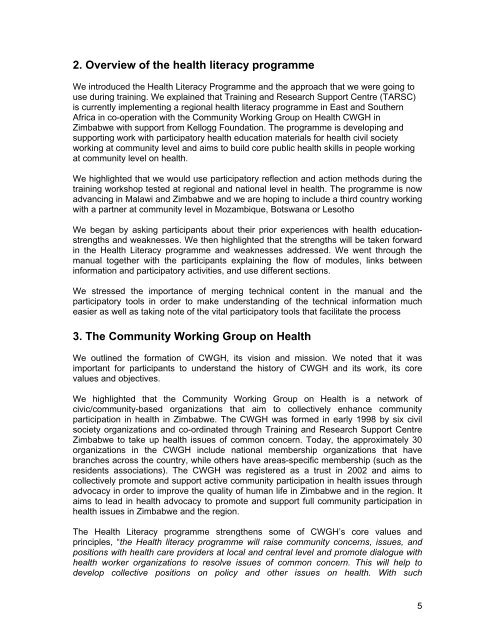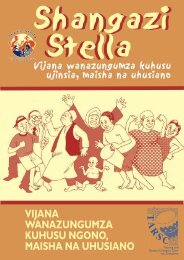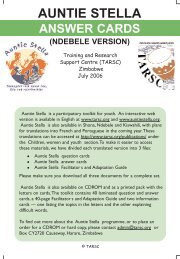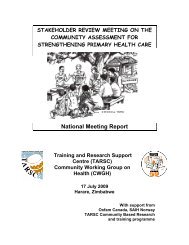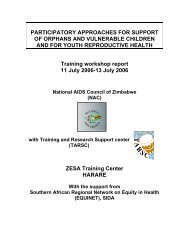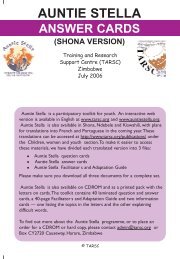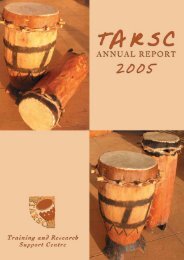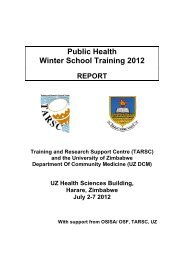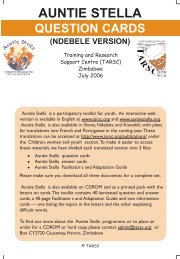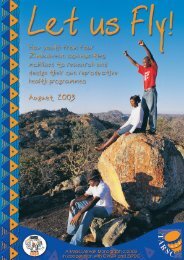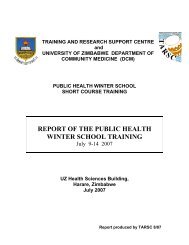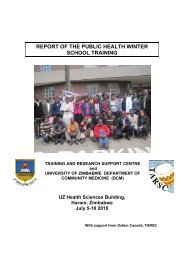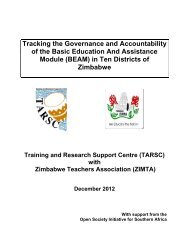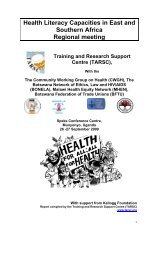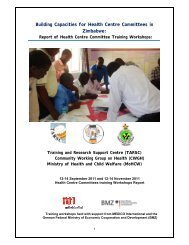HL sthnreg factng rep07.pdf - Training and Research Support Centre
HL sthnreg factng rep07.pdf - Training and Research Support Centre
HL sthnreg factng rep07.pdf - Training and Research Support Centre
You also want an ePaper? Increase the reach of your titles
YUMPU automatically turns print PDFs into web optimized ePapers that Google loves.
2. Overview of the health literacy programme<br />
We introduced the Health Literacy Programme <strong>and</strong> the approach that we were going to<br />
use during training. We explained that <strong>Training</strong> <strong>and</strong> <strong>Research</strong> <strong>Support</strong> <strong>Centre</strong> (TARSC)<br />
is currently implementing a regional health literacy programme in East <strong>and</strong> Southern<br />
Africa in co-operation with the Community Working Group on Health CWGH in<br />
Zimbabwe with support from Kellogg Foundation. The programme is developing <strong>and</strong><br />
supporting work with participatory health education materials for health civil society<br />
working at community level <strong>and</strong> aims to build core public health skills in people working<br />
at community level on health.<br />
We highlighted that we would use participatory reflection <strong>and</strong> action methods during the<br />
training workshop tested at regional <strong>and</strong> national level in health. The programme is now<br />
advancing in Malawi <strong>and</strong> Zimbabwe <strong>and</strong> we are hoping to include a third country working<br />
with a partner at community level in Mozambique, Botswana or Lesotho<br />
We began by asking participants about their prior experiences with health educationstrengths<br />
<strong>and</strong> weaknesses. We then highlighted that the strengths will be taken forward<br />
in the Health Literacy programme <strong>and</strong> weaknesses addressed. We went through the<br />
manual together with the participants explaining the flow of modules, links between<br />
information <strong>and</strong> participatory activities, <strong>and</strong> use different sections.<br />
We stressed the importance of merging technical content in the manual <strong>and</strong> the<br />
participatory tools in order to make underst<strong>and</strong>ing of the technical information much<br />
easier as well as taking note of the vital participatory tools that facilitate the process<br />
3. The Community Working Group on Health<br />
We outlined the formation of CWGH, its vision <strong>and</strong> mission. We noted that it was<br />
important for participants to underst<strong>and</strong> the history of CWGH <strong>and</strong> its work, its core<br />
values <strong>and</strong> objectives.<br />
We highlighted that the Community Working Group on Health is a network of<br />
civic/community-based organizations that aim to collectively enhance community<br />
participation in health in Zimbabwe. The CWGH was formed in early 1998 by six civil<br />
society organizations <strong>and</strong> co-ordinated through <strong>Training</strong> <strong>and</strong> <strong>Research</strong> <strong>Support</strong> <strong>Centre</strong><br />
Zimbabwe to take up health issues of common concern. Today, the approximately 30<br />
organizations in the CWGH include national membership organizations that have<br />
branches across the country, while others have areas-specific membership (such as the<br />
residents associations). The CWGH was registered as a trust in 2002 <strong>and</strong> aims to<br />
collectively promote <strong>and</strong> support active community participation in health issues through<br />
advocacy in order to improve the quality of human life in Zimbabwe <strong>and</strong> in the region. It<br />
aims to lead in health advocacy to promote <strong>and</strong> support full community participation in<br />
health issues in Zimbabwe <strong>and</strong> the region.<br />
The Health Literacy programme strengthens some of CWGH’s core values <strong>and</strong><br />
principles, “the Health literacy programme will raise community concerns, issues, <strong>and</strong><br />
positions with health care providers at local <strong>and</strong> central level <strong>and</strong> promote dialogue with<br />
health worker organizations to resolve issues of common concern. This will help to<br />
develop collective positions on policy <strong>and</strong> other issues on health. With such<br />
5


